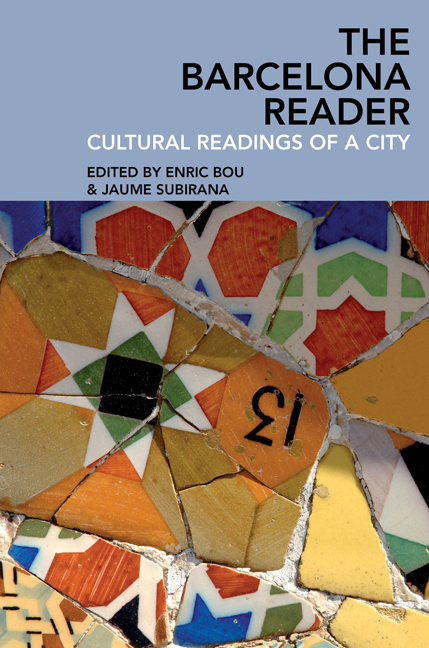Introduction: Barcelona: Cultural readings of a city
Summary
In 1972 an independent filmmaker, Jordi Lladó, collaborated with a few actors from Els Joglars company to shoot Aullidos, a short film that tried to stage the beauties of Barcelona. Franco's dictatorship was still very much alive, a greyness (the colour of the uniforms of the repressive police, the air, the mood) filled everything. The result was a hysterical portrait of things to visit in a depressed city, among others scuba diving in Barcelona's sewer system, buying postcards picturing a slump, and picnicking at Montcada's turó [hill] near a cement factory. It was 40 years before a Mexican filmmaker made a similar move and portrayed a poignant image of a ‘beautiful’ city unfriendly to immigrants and poor people alike. It was also 40 years before the city became, much to the dismay of many of its inhabitants, one of the most popular tourist destinations in Europe. The city's 1.6 million residents have seen the number of visitors skyrocket from 1.7 million in 1990 to more than 8.2 million in 2015. Barcelona, ‘la Gran Encisera’ (the Great Enchantress) as defined by Joan Maragall, one of her greatest poets, has constantly delivered a dual yet contradictory message: la rosa de foc [the rose of fire] for the anarchists and ciudad de ferias y congresos [city of fairs and conventions] during the dictatorship; pickpocket trap and tourist paradise.
The aim of this book is to provide an in-depth overview of Barcelona through texts written by a selected group of scholars who have devoted much time and energy to studying the city. We have drawn together published and unpublished work that best illuminates a wide-ranging selection of critical perspectives of Barcelona, ways of reading the city from complementary cultural approaches, stressing the negatives, but also the glowing aspects of the city. The book provides scholars, students, journalists, and visitors looking for a more comprehensive approach to Barcelona than tourist guides can deliver with an overview of the central issues about Barcelona. We have included both strictly scholarly and non-scholarly writings, thus enabling a wider range of perspectives.
The seeds of this book were sown a few years ago, when we started a discussion about how to present Barcelona to a foreign audience. For the last 30 years now a number of colleagues have been teaching courses on different aspects of Barcelona.
- Type
- Chapter
- Information
- The Barcelona ReaderCultural Readings of a City, pp. 1 - 18Publisher: Liverpool University PressPrint publication year: 2017



